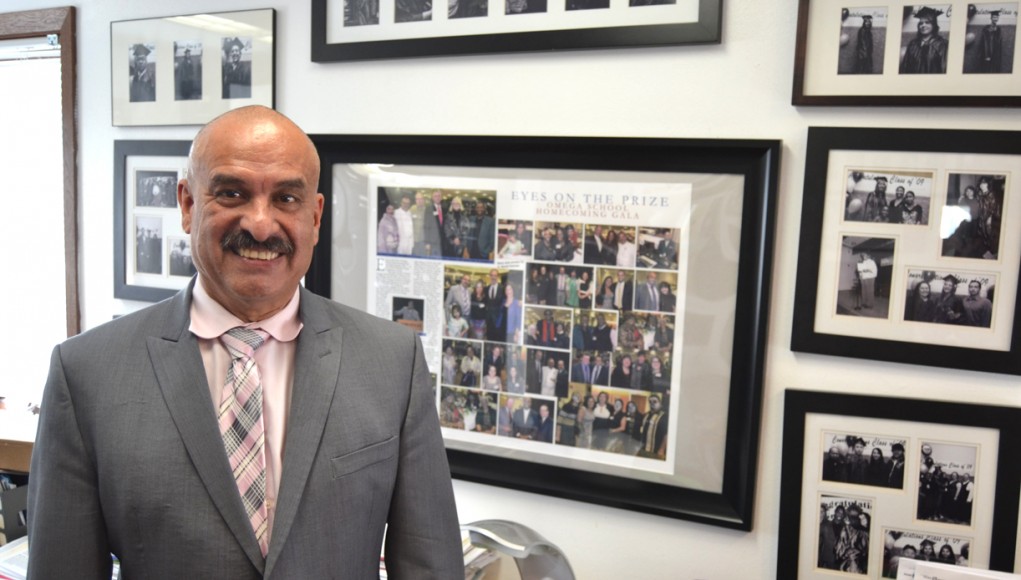“There has been some studies done and for those who finish high school they make over $250,000 more in income over your lifetime than those that don’t finish high school,” says Oscar Mireles, executive director and principal of Omega School. “Getting a GED is really about providing access and opening doors.”
Weird things can happen in life when you are a youngster. Tragic things can happen. Sometimes, the train just comes off the tracks and for a variety of reasons people miss out on a chance to graduate from high school. But that doesn’t have to be the end of it. For 43 years, Omega School on Madison’s south side has been an alternative, adult basic education and diploma completion program that prepares students who missed out on a high school diploma to earn their GED through its alternative, one-on-one approach to learning.
“I see graduates out on the street and they are now working and are productive adults. They’re raising kids and staying out of trouble,” Mireles tells Madison 365. “They’re pursuing the American dream like us and paying taxes and working and grinding through. Just knowing that we helped them get through their next phase in becoming an adult … that makes us happy.”

Thousands and thousands have been helped by Mireles and his Omega staff over the years. For most people in the community, Mireles is well known as affable and good-humored type of guy. With his students, he can be pretty strict and direct.
“Some of them just needed a little structure and some need clear goals. I’ve always made it clear that they needed to be here and to be focused and to do their part. They have to make this a priority,” Mireles says. “It makes their life easier that I was clear. Sometimes, people want to be too nice to people. But some of these students are so used to doing what they want all the time and that’s just one of the habits I have to break.”
Omega School offers GED and HSED instruction to help people earn their high school equivalency diplomas. The Basic Skills/GED Program is the agency’s core program from which all administrative and new project developments flow. GED/High School Equivalency topic areas include science, social studies, language arts writing, language arts reading, and mathematics.
Complicating matters has been the new era of testing that began last year with the computerized GED test. It has made everybody adjust their approach.
“For GEDs, the landscape has changed. It’s a little different. The days of just going to take the test are gone. So, one, I would encourage students to stay in school and finish high school because the GED is going to be a lot more work than people are aware of,” Mireles says. “It’s not going to be something that you are going to be able to do relatively quickly.”
Also, the price to take the GED has doubled. It’s now $120 along with another $24 to take the practice test. “For a lot of people that’s a lot of money,” Mireles says.
So, with the latest overhaul of the GED, the new test is more expensive, it is computerized, and it got more challenging. Across the country, it has affected the number of people who are finishing. Mireles says the national numbers have gone down 75-90 percent. “In Wisconsin, there’s been about a 90 percent drop,” he says. “Our goals are get back to the numbers we once had as quickly as we can. I just want to remind students that they can still find success, they just have to put in the time and effort.”
With the new test, Omega School has revised some of its curriculum with support from the Madison Community Foundation. “That’s made a big difference. Now, we have a clear plan. A lot of our students come at the sixth-grade reading level, so this is designed to help them out,” Mireles says. “Meet them at where they are at and help take them to where they need to go.”
Omega also recently received a generous donation of computer laptops, so they will have a laptop loan program where students can check out the laptops and have software where they can work at home. Omega has also created an online course. “Students have all of the materials so they can work independently and they can work interactively online,” Mireles says. “If they have a question, they can pose it to the instructor online and they will answer it.”
Mireles has been with Omega School since 1994. “Back in the day, we were sort of an open space,” Mireles remembers. “The problem was that there was not a lot of privacy. So, now, with the private rooms here, I think students feel comfortable opening up and sharing stuff.”
In his 21 years, Mireles has seen thousands of people come through Omega. He has actually seen children of some of his old graduates. “I wasn’t so happy about that,” grumbles Mireles. “But I’m glad they are here getting it done.”
The racial make-up of students at Omega is 50 percent white, 40 percent African American, and 10 percent Latino. Students that come to Omega can be of all ages, but Mireles says the average age is around 20. “For us, that’s good … because the average age of a GED person is 25,” he says. “We’re reaching a younger, tougher population. Generally, when they come at 25, the school of hard knocks has kind of beat down some of their feistiness and their unwillingness to listen and bad attitudes.”

Graduation time is the fun time for Omega School when they all gather at Madison College in caps and gowns and share stories of their journeys and listen to inspirational speakers. “All of the moments make it worthwhile, but when I see them up on the stage and with their families, I’m very proud,” Mireles says.
Housed in the former Centro Hispano of Dane County building at 835 W. Badger Road, Omega School is full of Omega School graduate pictures in their blue gowns and caps. Literally everywhere you go there are pictures on the walls celebrating the successes of Omega. There are reminders that many important Madisonians – including Dane County Executive Joe Parisi – were once Omega School attendees.
“When they can see the pictures of graduates on our walls, they know that people have done it and gone on to great things,” says Mireles. “If you don’t believe it, it’s not going to happen. You have to believe it’s possible. That’s part of our job, helping them believe that anything is possible. Because it is.”
To learn more about Omega School, call the school at 256-4650 or visit www.omegaschool.org










